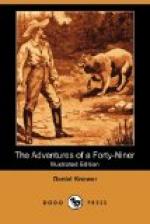We had no trouble with our men after that. The
colonel at Chagres had evidently given us his best
man. They found that we were masters of the situation
and it was for their interest to submit. We treated
them kindly after that, and all went well, for we
passed every boat we came to. I shall never forget
the look of despair at two Frenchmen, evidently gentlemen,
as we went by them, and they informed us the length
of time they had been coming up the river, and that
they could do nothing with their men. That afternoon
we came in sight of a thatched hut on the banks, evidently
a ranch. We thought it for our interest to rest.
We saw a man whom we took for the proprietor, entirely
naked, rubbing his back against a post. On landing
and approaching him he excused himself for a short
time, and returned dressed, walking with the air of
a lord of a manor, which dress consisted of a coarse
bagging shirt, coming down to his knees. We arrived
the next day at 11 A.M., at Gorgona, and took our dinner
at the hotel kept by the Alcalde of the place, and
bargained with him for a guide and three mules to
continue our journey to Panama. As soon as our
guides and mules were ready, about 1 P.M., we started
for Panama. We soon got enough of our mules by
being thrown a number of times over their heads.
They did not understand our language. “Get
up and go along,” was Greek to them, but when
the guide said “mula vamous” they knew
what it meant. On reaching the place where we
were to stay all night, we arose in the morning refreshed,
but concluded to leave our mules and make the rest
of the way a-foot, as we considered them a nuisance,
and as we had no baggage but my little satchel previously
referred to, in which I had bills of lading of my houses,
they being consigned to me, the specifications of
my carpenter’s schedule, my letters and a gold
chronometer watch, worth $250, belonging to H., a
broker in New York, a friend, and a bottle of the best
brandy, which he presented to me to keep off the fever
in crossing the Isthmus. This bag I handed to
the guide boy, about seventeen years of age, taking
out the brandy bottle. The watch I was to sell,
for he had two nephews who had gone to California,
and if they were in need, to supply their wants.
I did not meet them; sold the watch for $500 to Mr.
Haight, one of the owners of the Miners’ Bank
in San Francisco, and remitted the money to my friend,
so I shall not refer to the watch again.
We were walking on at a free pace, our guide boy following behind. Looking back after awhile we could not see him. We stopped and waited some time, but he did not come, so we thought we would go on and he would follow. The result was we lost our way and craved for a sight of the Pacific ocean with all the ardor that Gilboa could have done, the first Spanish discoverer of it, and on the same route, after our wanderings all day, almost without hope, until four in the afternoon, we came to a stream of water; oppressed




